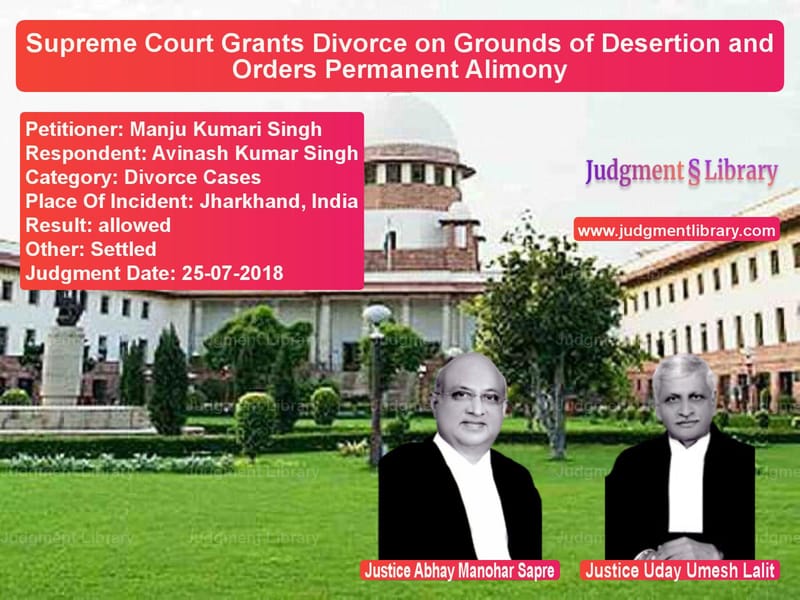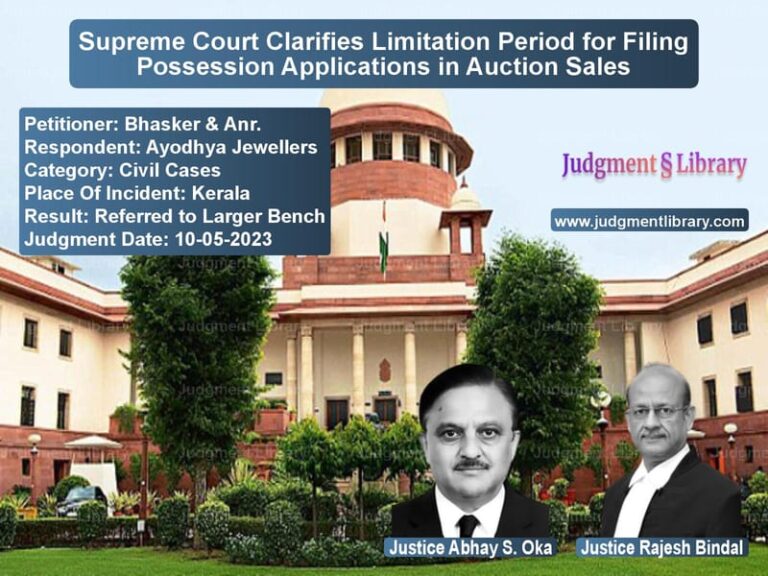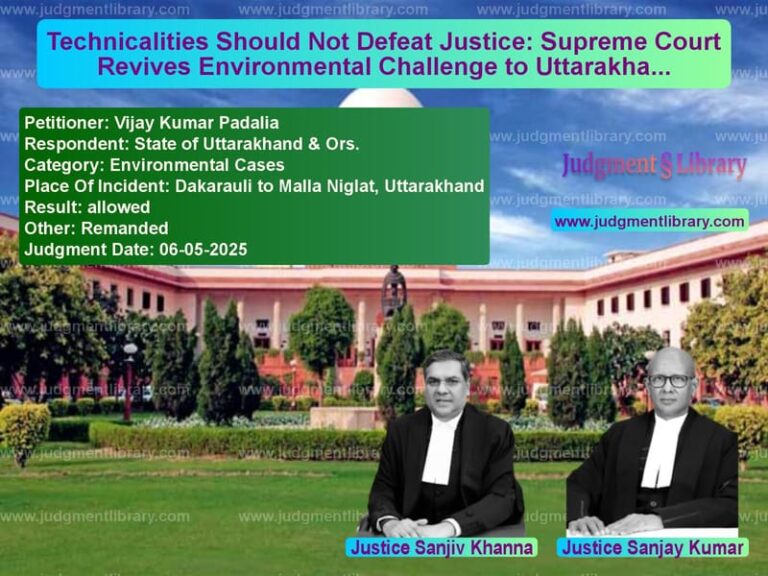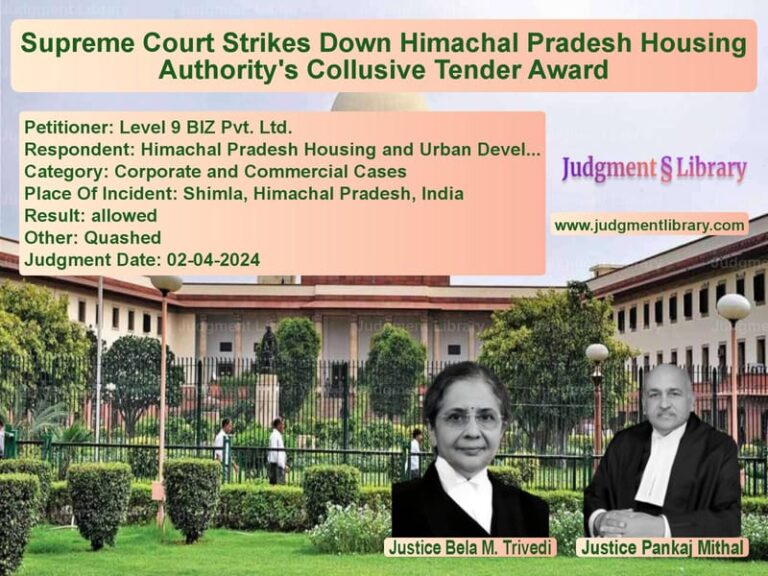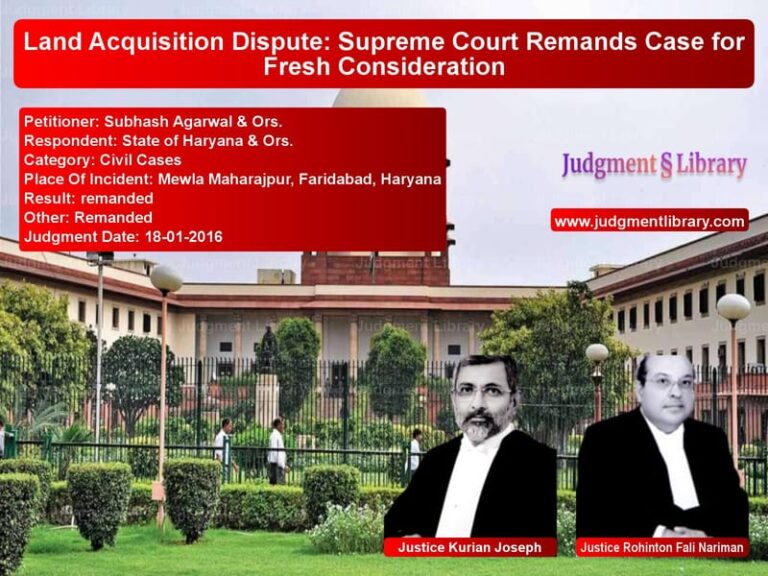Supreme Court Grants Divorce on Grounds of Desertion and Orders Permanent Alimony
The Supreme Court of India, in Manju Kumari Singh vs. Avinash Kumar Singh, delivered a significant ruling regarding divorce, desertion, and permanent alimony. The case involved a long-standing marital dispute where the husband sought divorce on the grounds of cruelty and desertion. The Supreme Court, while granting the divorce, also directed the husband to pay Rs. 10,00,000 as permanent alimony to the wife and their daughter.
Background of the Case
The appellant, Manju Kumari Singh, and the respondent, Avinash Kumar Singh, were married on February 16, 1997. The appellant is a teacher, while the respondent is a practicing advocate. The couple was blessed with a daughter in 1998, who has been living with the appellant since birth. However, their marital life was not cordial soon after marriage, leading to the filing of a divorce petition by the husband in 2001.
The respondent (husband) sought divorce on the grounds of cruelty and desertion. The appellant (wife) contested the allegations and denied any wrongdoing. Despite multiple reconciliation efforts, the couple continued to live separately for over a decade.
Legal Issues in the Case
- Whether the allegations of cruelty and desertion against the wife were substantiated by evidence.
- Whether the long separation between the parties justified granting a decree of divorce.
- Whether the wife and daughter were entitled to permanent alimony and financial support.
Petitioner’s Arguments
The respondent (husband) contended:
- The appellant had subjected him to mental cruelty, making it impossible for him to continue the marriage.
- The appellant had voluntarily deserted him without reasonable cause, thereby fulfilling the legal requirement for divorce under the Hindu Marriage Act.
- Despite multiple attempts at reconciliation, the appellant had refused to resume cohabitation, proving an irretrievable breakdown of marriage.
Respondent’s Arguments
The appellant (wife) countered:
- The allegations of cruelty and desertion were baseless and unsubstantiated.
- She had been taking care of their daughter alone and was fulfilling her parental responsibilities.
- The husband’s petition was an attempt to avoid financial obligations towards her and their daughter.
Supreme Court’s Observations
The Supreme Court carefully examined the facts, the legal position, and precedents regarding divorce under the Hindu Marriage Act. The Court ruled:
“We have observed that the parties have been living separately for more than a decade. All attempts of reconciliation through mediation have failed. It is clear that there is absolutely no chance of both living together to continue their marital life.”
The Court further referred to the case of Naveen Kohli v. Neelu Kohli (2006) 4 SCC 558, wherein it was held that when a marriage is beyond repair due to differences, it is best to recognize the reality and dissolve the marriage legally.
Final Judgment and Directives
The Supreme Court, after considering all aspects, ruled:
- The marriage between the appellant and the respondent was dissolved on the ground of desertion.
- The respondent (husband) was directed to pay Rs. 10,00,000 as permanent alimony in two installments.
- The first installment of Rs. 5,00,000 was to be paid to the daughter within three months from the date of the judgment.
- The second installment of Rs. 5,00,000 was to be paid within four months of the first payment.
- All pending cases arising from matrimonial proceedings were disposed of.
- Any allegations made in previous proceedings were expunged from records.
Implications of the Judgment
The ruling has far-reaching implications for divorce and matrimonial law:
- Recognition of Irretrievable Breakdown of Marriage: The Court acknowledged that when a marriage is beyond repair, granting divorce is the only viable solution.
- Fair Alimony Provisions: The judgment ensures financial security for the wife and child by granting substantial alimony.
- Deterrence Against Frivolous Allegations: The expungement of past allegations prevents unnecessary character defamation in legal proceedings.
- Ensuring Peaceful Future: By settling financial matters and closing pending cases, the ruling helps both parties move forward peacefully.
Conclusion
The Supreme Court’s decision in Manju Kumari Singh vs. Avinash Kumar Singh brings clarity on the issue of desertion in divorce cases. The judgment balances the rights of both spouses while ensuring financial support for the dependent child. By granting alimony and declaring the marriage dissolved, the Court has provided a pragmatic solution to a prolonged matrimonial dispute, setting an important precedent for future cases.
Petitioner Name: Manju Kumari Singh.Respondent Name: Avinash Kumar Singh.Judgment By: Justice Abhay Manohar Sapre, Justice Uday Umesh Lalit.Place Of Incident: Jharkhand, India.Judgment Date: 25-07-2018.
Don’t miss out on the full details! Download the complete judgment in PDF format below and gain valuable insights instantly!
Download Judgment: Manju Kumari Singh vs Avinash Kumar Singh Supreme Court of India Judgment Dated 25-07-2018.pdf
Direct Downlaod Judgment: Direct downlaod this Judgment
See all petitions in Alimony and Maintenance
See all petitions in Divorce by Desertion
See all petitions in Child Custody
See all petitions in Judgment by Abhay Manohar Sapre
See all petitions in Judgment by Uday Umesh Lalit
See all petitions in allowed
See all petitions in settled
See all petitions in supreme court of India judgments July 2018
See all petitions in 2018 judgments
See all posts in Divorce Cases Category
See all allowed petitions in Divorce Cases Category
See all Dismissed petitions in Divorce Cases Category
See all partially allowed petitions in Divorce Cases Category

